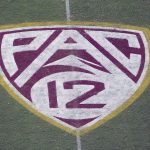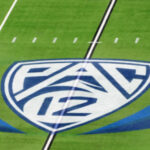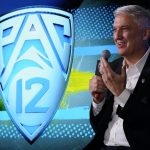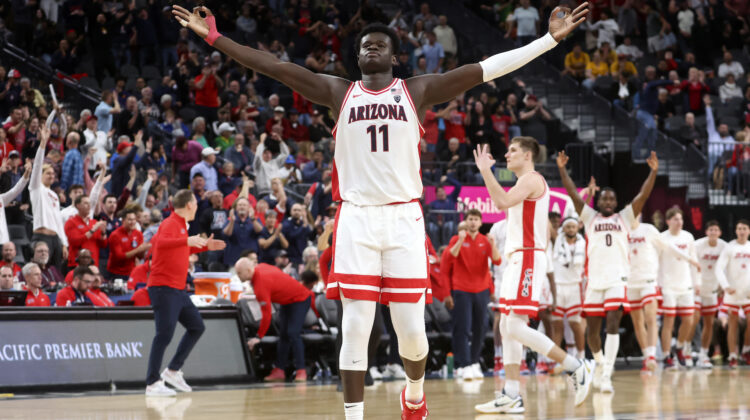The Pac-12 broke precedent on Selection Sunday, sending four teams into the men’s NCAA Tournament when recent history indicated a maximum of three would be invited.
Yes, this could have been much worse, folks.
The framework for NCAA bids is established in November and December, during the non-conference matchups that create ceilings and floors in the all-important NET rankings. And the Pac-12 was atrocious in the early months of the season.
It won a meager 63.6 percent of the games against outside competition — the lowest non-conference win rate, by far, among the power leagues.
On four previous occasions in the 12-school era, including last season, the Pac-12 won less than 70 percent of its non-conference games. Each time, it advanced no more than three teams to the NCAAs.
This season, the Pac-12 lost four games to the Southwestern Athletic Conference, five to the Mountain West and six to the Big 12 on its stumbling, bumbling path to that 63.6 winning percentage.
But despite the ghastly showing in the games that matter most, the Pac-12 managed to grab a fourth NCAA bid — barely.
Arizona State was the second-to-last team in the field and will play Nevada (and coach Steve Alford) in a First Four matchup on Wednesday.
USC was one line above the Sun Devils, grabbing the No. 10 seed in the East.
Those bubble teams joined powerhouses UCLA and Arizona, which earned No. 2 seeds in the West and South, respectively, to create the Pac-12’s quartet.
Earning four bids isn’t cause for celebration, but it surely brings a sigh of relief to the conference office and campuses across the footprint.
At one point during the season, the Pac-12 was careening toward two paltry bids.
In that regard, the Pac-12 stands as one of the Selection Sunday winners.
Our look at the landscape …
Winner: Pac-12 South. Referencing the old football divisions allows us to best sketch the imbalance that existed throughout the season. The hardwood power was concentrated in L.A. and Arizona.
Loser: Pac-12 North. The Washington, Oregon and Bay Area schools went 0-for-6 in NCAA bids, but at least they had a football season to remember! (Most of them, anyway.)
Winner: UCLA. The Bruins were seeded on the same line (No. 2) as Arizona but received the coveted placement in the West. Win twice in Sacramento, and they would head (back) to T-Mobile Arena in Las Vegas.
Loser: Arizona. The Wildcats beat UCLA twice, won the conference tournament and had a better collection of victories than UCLA. But their losses were second rate and produced an assignment in the South, with a regional in Louisville.
Winner: Unpredictability. At this point in the analysis, we will remind elated UCLA fans and dejected Arizona fans that matchups are more important than location.
Loser: North Carolina. The storied program, which reached the national championship game last year, didn’t make the NCAA field. That’s a tumble not often seen, especially in the realm of the blue bloods. And guess what? The Heels turned down an invitation to the NIT.
Winner: The Big 12. The best league in the land throughout the regular season was justly rewarded by the committee with seven bids — or 70 percent of its membership. Yes, the SEC and Big Ten are sending eight teams into the Madness, but they have many more schools (14) than the Big 12.
Loser: San Diego State. The Aztecs received a No. 5 seed, which was wholly justified. But they drew an extremely dangerous opening foe in No. 12 Charleston and would have to face Virginia in the second round
Winner: Mountain West. For the second consecutive year, the league received four bids — as many as the Pac-12 and only one fewer than the Big East. The goal now is to avoid a repeat of the 2022 wipeout in which the conference went 0-4.
Loser: Oregon. The Ducks missed the NCAAs for the second consecutive season, a double-whammy that has only occurred once previously under coach Dana Altman (in 2011 and 2012, his first two seasons in Eugene). The NCAA miss comes despite a roster that looks fit for the NBA.
Winner: Arizona State. We felt the Sun Devils deserved a bid given their array of quality wins (Arizona, VCU, Creighton and Michigan) and the raw number of victories away from home (12), an overlooked piece of the process. It’s the first NCAA bid since the 2019 season for coach Bobby Hurley.
Loser: Little guys. Only five at-large berths were awarded to teams from conferences that don’t play major college football: four to the Big East and one to the West Coast (Saint Mary’s).
Winner: USC. The Trojans had to wait until the final regional was unveiled to hear their name called and must face a Hall of Fame coach in the first round (Michigan State’s Tom Izzo). No matter. It’s their third consecutive NCAA appearance.
Loser: Texas A&M. The Aggies finished second in the SEC during the regular season and lost the conference title game (to Alabama), yet they were handed a No. 7 seed. Our advice: Play somebody next time. Texas A&M’s non-conference schedule was ranked No. 243 nationally in the Pomeroy advanced metrics.
Winner: Alabama. The football powerhouse is the No. 1 overall seed in the NCAAs after a stellar season under coach Nate Oats. But the heat will be intense with so much focus on star Brandon Miller and the murder case gripping the Crimson Tide. (Miller has not been charged with a crime.)
Loser: East regional. With Purdue, Marquette, Kansas State and Tennessee as the top four seeds, the East sorely lacks star power. Its biggest attraction is No. 5 Duke, under first-year coach Jon Scheyer.
Winner: West regional. The most intriguing regional, and it’s not even close. Top-seeded Kansas has coach Bill Self coming back from a hospital stay, while No. 13 Iona claims a fairly famous frontman of its own (Rick Pitino). The bottom half of the bracket features No. 2 UCLA and No. 3 Gonzaga, which are slotted to square off in the Sweet 16 just two years after playing one of the greatest games in tournament history.
*** Send suggestions, comments and tips (confidentiality guaranteed) to pac12hotline@bayareanewsgroup.com or call 408-920-5716
*** Follow me on Twitter: @WilnerHotline
*** Pac-12 Hotline is not endorsed or sponsored by the Pac-12 Conference, and the views expressed herein do not necessarily reflect the views of the Conference.
Related posts:

(AP Photo/Ralph Freso, File)
Wilner Hotline: Nine Need-to-Knows for Week Seven Hotline mailbag: Pros and cons of the Pac-12 partnering with Apple, expansion odds, merger options, backup plans and more
Hotline mailbag: Pros and cons of the Pac-12 partnering with Apple, expansion odds, merger options, backup plans and more
 Hotline mailbag: The problem with partial shares for Oregon and UW (in the Big Ten), pondering Tulane and Rice, a Pac-8 and more
Hotline mailbag: The problem with partial shares for Oregon and UW (in the Big Ten), pondering Tulane and Rice, a Pac-8 and more

(AP Photo/Marcio Jose Sanchez)
Hotline mailbag: ‘Worst-case scenario’ for the Pac-12, outlook for Oregon and UW, valuation rumors, expansion candidates and more
